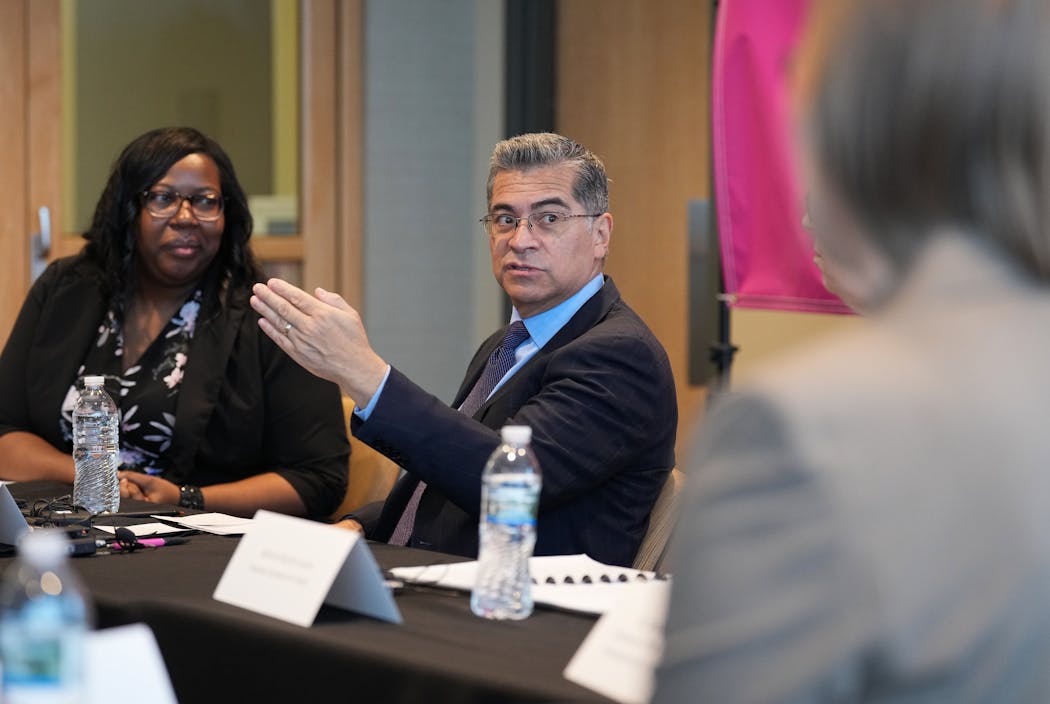U.S. Health and Human Services Secretary Xavier Becerra traveled to Minnesota on Thursday to listen to the struggles of health care providers facing a surge in demand for abortion services and to encourage Democratic leaders to continue to protect access.
His visit came just ahead of the 50th anniversary of the landmark Roe v. Wade decision legalizing abortion — which was struck down last year — and on the same day legislators in the Minnesota House voted 69-65 in favor of a bill to codify access to abortion in state law.
"You're going to make history at a time when regression seems to be on the table more than anything else," Becerra said at a Capitol news conference with Gov. Tim Walz and top DFL legislative leaders. "You're setting history in the right direction. … We are your partners in the fight."
Walz and DFL leaders also sent a message to those who live elsewhere and need abortion that Minnesota will be a "shining beacon" of safety.
"You are welcome here. You are seen. You are valued. You are protected," Walz said.
Republicans in the Legislature called Democrats' proposal to codify abortion access extreme. In committees, they tried to amend the bill to limit abortions after the second trimester and to require that the procedure be done in a hospital. Democrats rejected those amendments, saying they limited a patient's options.
"While Democrats won a close election here in the state, they do not have a mandate for this, for the policy that they are putting forward today," said Rep. Anne Neu Brindley, R-North Branch.
Abortion access is constitutionally protected in Minnesota through a 1995 state Supreme Court ruling known as Doe v. Gomez. The bill that passed the House would enshrine access to abortion in law for the first time in state history.
Minnesota is the outlier in the Upper Midwest. The U.S. Supreme Court's reversal of Roe v. Wade last June allowed South Dakota's trigger law to go into effect, banning most abortions. Minnesota providers anticipate access will soon be limited in more states.
On Friday, Becerra planned to travel to Wisconsin, where abortion is now banned again under a 1849 state law.
"A tale of two states, a tale of the injustice, inequality, denial of access, exclusion, whatever you want to call it," Becerra said after a morning roundtable at the Planned Parenthood office in St. Paul.
At the roundtable, Attorney General Keith Ellison said he's prepared to travel to other states to defend people who come to Minnesota to get an abortion.
"We're going to file motions and actions in that state to protect them," Ellison said. "How is that going to turn out? I don't know, but we're going to find out."
The Minnesota providers told Becerra about patients coming from as far as Texas to get abortions. Waitlists have grown, increasing the number of second-trimester abortions.
"Even though there is still access in Iowa and Nebraska, there is a particularly hostile political environment in those states and we anticipate that we will also lose access in those states," said Dr. Sarah Traxler, chief medical officer at Planned Parenthood North Central States, who travels the region to provide abortions.
Many health care providers fear a confusing legal landscape where they could be sued for providing an abortion to someone who lives in another state.
"It's really painful to think that, when you're a doctor and you know what the right thing to do for the patient is, that you have to ask the lawyer first," said Dr. Laura Nezworski, chair of women's health and wellness at Hennepin Healthcare. "That just seems ridiculous and frustrating."
The federal government established a task force on reproductive healthcare in advance of last year's Supreme Court's ruling. Shortly after the court overturned Roe, President Biden issued an executive order directing Becerra and his agency to make sure people have access to medication abortion and protecting data privacy for patients who get abortions.
"We're going to do everything we can," he said. "We know there will come a day when we erase this injustice."
During the Capitol news conference, Minneapolis lawyer Hannah Stein talked about her decision to have two abortions. The first was when she was 22 and was too immature and not prepared to have a child, she said. Her next came at age 35 when she and her husband already had four children, including 1-year-old twins.
"That was absolutely for us the right and responsible decision to make," she said of the second abortion.
Stein said she's excited and proud of Minnesota.
"We will light up a path of giving people the right and freedom to make their own choices," she said.
Senate Majority Leader Kari Dziedzic, DFL-Minneapolis, has not yet scheduled the bill codifying abortion access for a Senate vote, but said the act is "about expanding rights and freedoms in Minnesota, not taking them away," she said.
The DFL holds just a 34-33 edge in the Senate, but Dziedzic said she expects the bill to pass.
Former DFL Senate Majority Leader Kari Dziedzic dies of cancer at age 62

How the Star Tribune is covering the 2024 election

Fact check: Walz and Vance made questionable claims during only VP debate

In Tim Walz's home city, opposing groups watch him debate on the national stage


